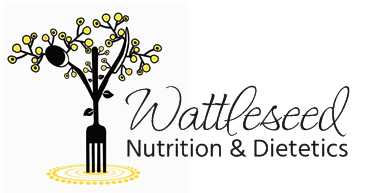Indigenous Food Sovereignty, Food Security & Nutrition
Tracy Hardy, Wattleseed Nutrition & DieteticsSelf-determination of traditional food systems, foods and enterprises improves food security and the nutrition-related health outcomes associated with being food insecure.
My name is Tracy Hardy, I am a Gamilaroi woman, Accredited Practising Dietitian and Nutritionist and founder of Wattleseed Nutrition & Dietetics. I am a freshwater woman, with a matrineal line of descent to the Barwon River region in North-West New South Wales. I was born and raised in a remote, river side pastoralist country town in South-West Queensland and have been lucky to call Gubbi Gubbi/Kabi Kabi country on Queensland’s Sunshine Coast, home since 2007. Understanding the value and significance of traditional food systems and foods, I strongly advocate their positive impacts on culture, food security, health and wellbeing for First Nation Peoples in Australia. In 2013, deciding to be a part of the change I wanted to see, I combined my passion for First Nations Peoples' health and wellbeing and love of food and commenced a Bachelor of Nutrition and Dietetics. It was during this time that I also conducted an honours project on the cultural safety of a chronic disease self-management program for First Nations Peoples in regional South East Queensland.
Completing my studies in 2017, I worked at the Institute or Urban Indigenous Health as both a clinical and community dietitian for First Nations Peoples in South East Queensland, including outreach work in Bundaberg, Rockhampton and Cherbourg. I also founded my business Wattleseed Nutrition & Dietetics where I combine academic, science and cultural knowledges, designing and facilitating nutrition education workshops and programs, guest lecturing and speaking and providing one-on-one consultations. In April 2019, I decided to further pursue my passion for traditional food systems, foods and security and commenced a PhD researching Indigenous food sovereignty and food security for First Nations Peoples of Australia. I have since taken leave from the PhD so that I may support community-based projects and do community-based work. However, my passion for promoting the revitalisation, protection and sustainability of our traditional food systems, foods and botanicals still burns bright. In fact, many of the community based and led projects I will be involved in and the NFP Indigenous Corporation I am in the process of establishing will include strategies and platforms to do just that.
My interest in Indigenous food sovereignty and food security stems from a strong sense of social justice and the burning desire to see a more just, equitable and fair Australia. With only around 1% of the profits from the multimillion-dollar bushfood and botanicals industry benefitting First Nations Peoples, whose sovereignty was never ceded from the lands from which these profits emerge, inequities and inequalities are evident and need to be addressed. My hope is that researching with and for First Nation Peoples and Communities will assist in strengthening capacity and building coalitional consciousness, that influence positive change and benefit not only First Nations Peoples, but all people living in Australia.
There is emerging interest and evidence of the value of Indigenous knowledges in improving agricultural and land-management practices so that they can provide food that nourishes us all. I believe promoting these knowledges and research offers an opportunity to celebrate our strengths, challenge negative stereotypes and encourage deeper understanding, respect, compassion and action. Evidence is emerging that increased self-determination of traditional food systems, foods and enterprises improves food security and the nutrition-related health outcomes associated with being food insecure. Prior to colonisation, First Peoples of Australia had secure and sustainable access to traditional lands and foods for the millennia. This was sustained through deeply understanding the reciprocal nature of caring for our lands and foods and sharing of that knowledge from one generation to the next. My goal is to contribute to the revitalisation and protection of our traditional food systems and sharing of knowledges, and to the self-determination of positive change so that our children are able to receive this valuable cultural knowledge and that all our children and children’s children enjoy the same length of life, the same quality of life, health and well-being.
I chose to join Sustain: The Australian Food Network, as I appreciate the focus on delivering positive outcomes in food systems and the many programs and avenues taken to ensure that happens. For me, as one of the very few dietitians who identifies as a First Nations Person in Australia, I provide support to clients who are experiencing nutrition-related health conditions as a result of food insecurity and the numerous underlying determinants resulting from settler colonialism. Inequality and inequity in our food systems being amongst those. To be involved in an organisation that is seeking for a fairer and more just food system provides me hope for a bright, healthful and well-nourished future for all.
